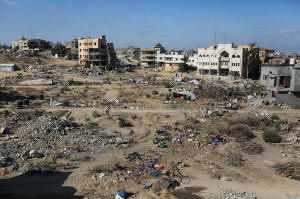Polio cases 'very likely' in Gaza population, WHO says
 Send a link to a friend
Send a link to a friend
 [July 30, 2024]
GENEVA (Reuters) - It is very likely that polio has infected
people in the Gaza Strip, in what would be a setback for global efforts
to eradicate the disease, a World Health Organization spokesperson said
on Tuesday. [July 30, 2024]
GENEVA (Reuters) - It is very likely that polio has infected
people in the Gaza Strip, in what would be a setback for global efforts
to eradicate the disease, a World Health Organization spokesperson said
on Tuesday.
Gaza's health ministry declared a polio epidemic across the Palestinian
enclave late on Monday after samples of the virus were found in sewage.
It has not announced any human cases.
According to the WHO, polio is now endemic only in Pakistan and
Afghanistan, but more than 30 countries are still listed as subject to
outbreaks, including Gaza's neighbours Egypt and Israel. Any country
risks a return of polio if outbreaks are not contained with mass
vaccinations.
The WHO's Christian Lindmeier told a U.N. press briefing that people had
probably already been infected in Gaza but that detecting cases can be
difficult since most cases of the potentially deadly viral disease are
asymptomatic.
"Having vaccine-derived polio virus in the sewage very likely means that
it's out there somewhere in people," he said. "So the risk of (it)...
spreading further is there and it would be a setback definitely (for
global efforts)."
He said an investigation and risk assessment was under way in Gaza.

Poliomyelitis, which is spread mainly through the faecal-oral route, is
a highly infectious virus that can invade the nervous system and cause
paralysis and death in young children.
Cases of polio have declined by 99% worldwide since 1988 thanks to mass
vaccination campaigns and efforts continue to eradicate it completely.
The WHO has sent more than 1 million vaccines to prevent children from
being infected in Gaza. Israel's military, which is fighting Hamas in
Gaza after the group killed 1,200 people and kidnapped 253 in Oct. 7
cross-border attacks, said last week it would start offering polio shots
to its soldiers there.
[to top of second column]
|

A general view of the damage in the eastern side of Khan Younis as
Palestinians make their way to return after Israeli forces pulled
out from the area following a raid, amid the Israel-Hamas conflict,
in Khan Younis, in the southern Gaza Strip July 30, 2024. REUTERS/Hatem
Khaled/File Photo
 James Elder, spokesperson for the
U.N. children's agency, said that more than nine months of conflict
had led to a drop in polio vaccination rates from 99% to 89%. He
voiced concerns about vaccines reaching people in need, given
humanitarian access constraints into and within the enclave.
"The mass displacement, the decimation of health infrastructure, the
horrendously insecure operating environment, they will make it much,
much more difficult (to do vaccinations), hence putting more and
more children at risk."
Israel, which vets goods entering Gaza and is in charge of granting
security clearance for aid convoys within it, blames U.N.
inefficiency for aid delays.
Gaza's health ministry says over 39,000 people have been killed in
Israel's military offensive. Humanitarian workers say the real death
toll including those killed by disease is likely much higher given
high case numbers of Hepatitis A, dysentery and other diseases among
people displaced by the conflict.
(Reporting by Emma Farge; Additional reporting by Ali Sawafta in
Ramallah; Editing by Peter Graff)
[© 2024 Thomson Reuters. All rights reserved.]This material may not be published,
broadcast, rewritten or redistributed.
Thompson Reuters is solely responsible for this content.
 |